The Mauritanian Supreme Court heard the final appeal of a blogger Mohamed Cheikh Ould M’kheitir on 15 November 2016. He is appealing a death penalty for “apostasy”. The decision on his case is being withheld until 20 December 2016.
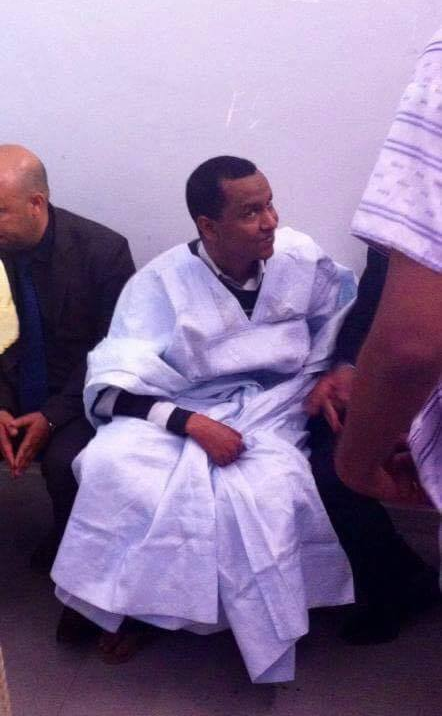
A rare photo of M’kheitir since his arrest, at the appeals court in April 2016
M’kheitir has been in prison since his initial arrest early in 2014. He had been accused of “apostasy” and “insulting the Prophet”, over an article about religious justifications offered for slavery.
At his initial, one-day trial on 24 December 2014 he was sentenced to death. The conviction in December 2014 was for “insulting the Prophet” and also “hypocrisy” (which means that the court did not believe that his repentance of “apostasy” was sincere). There were numerous irregularities in the trial including failure to take evidence into account, the police loss of “repentance” tapes, and the refusal of the court to allow the content of M’kheitir’s writing to be discussed.
Over a year later, his appeal hearing was due in April 2016 (at one stage there were fears that no lawyer would defend him). Lawyers had to be flown in from Tunisia to defend M’kheitir. The charge of “apostasy” was reinstated and the death sentence was upheld.
M’kheitir’s writing
The article over which M’kheitir was accused of “insulting the Prophet Muhammad” is Religion and religiosity for “Maalemine” (“الدين و التدين و “لمعلمين). While derived from the high Arabic for ‘teacher’, maalemine in the Mauritanian context refers to usually darker-skinned people descended from blacksmiths, carpenters and other skilled laborers regarded as “low caste” and still subject to discrimination. M’kheitir himself is a descendant of this “low” Maalemine caste.
The piece discusses religious double-standards, including how scriptural narration and the biography of the prophet Muhammad may act to normalize slavery. Mauritania has outlawed slavery but the caste-based system of indentured servitude is ongoing, and the authorities have frequently harassed campaigners who work to end the practice.
Religious and political pressures, angry crowds at court
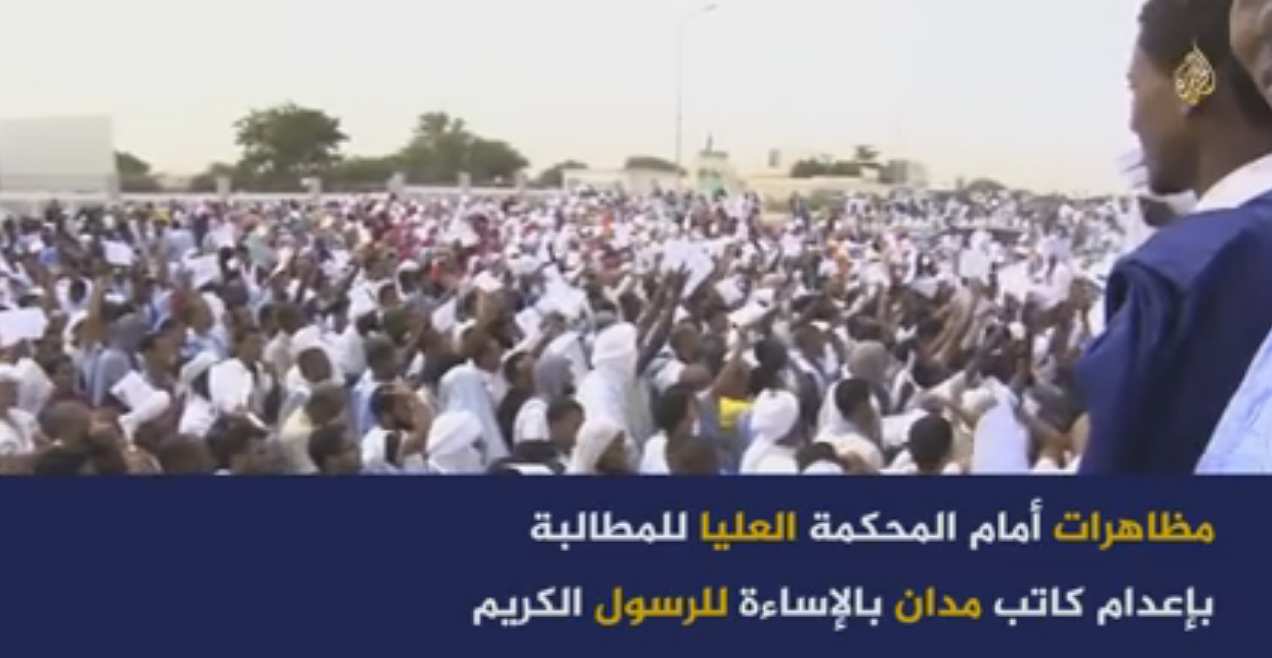 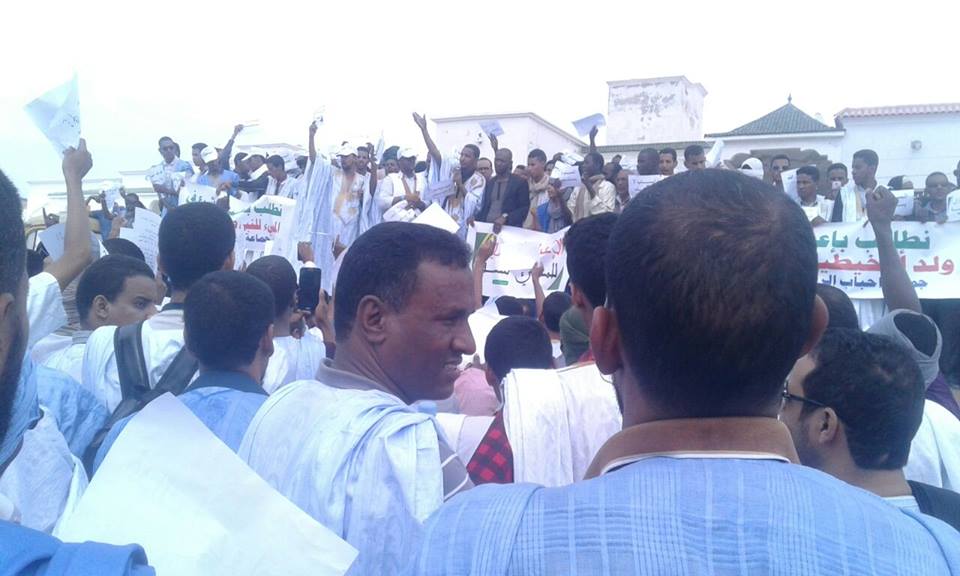 |
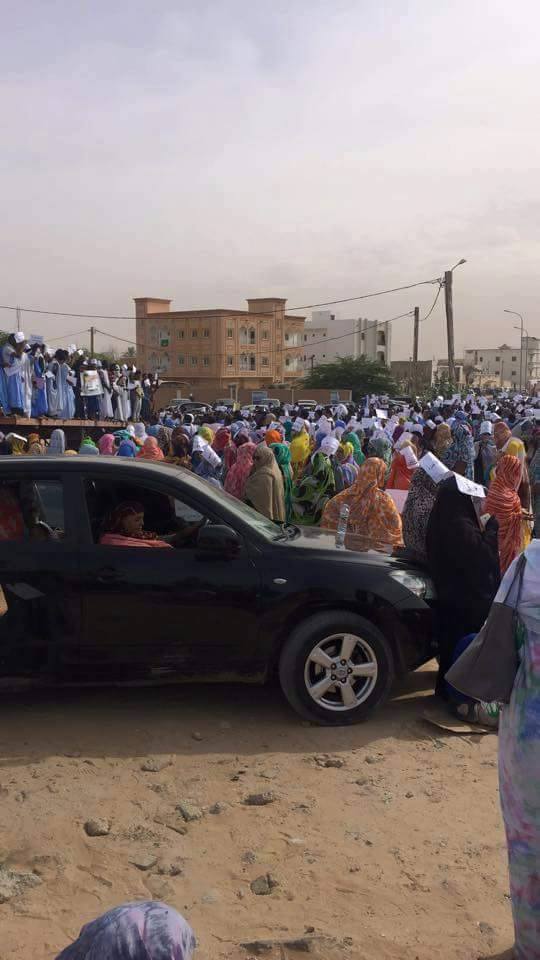 |
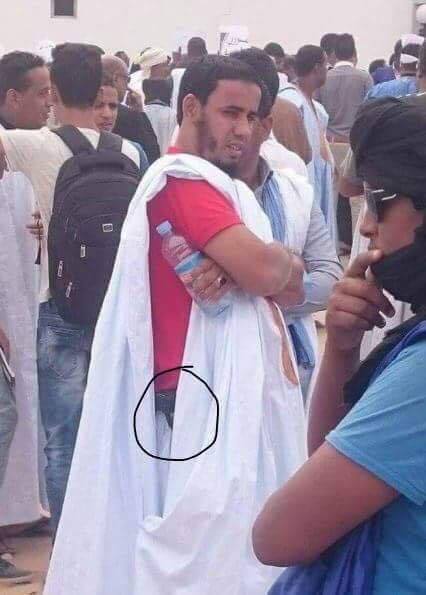 |
On 15 November 2016 the Supreme Court in Nouakchott held a final appeal hearing. Local media reported that the protesters numbered in the “thousands”, and Al Jazeera has footage of large crowds chanting “Allahu Akbar” and calling for the death penalty to be upheld. (Local media reports that the image above of a protester with a partially concealed weapon is the leader of an Islamist pressure group.)
There have been crowds at court at each stage of M’kheitir’s legal process demanding his death.
Radical Islamist groups and religious leaders have repeatedly called for M’kheitir’s death, often by misrepresenting the content of his article. The case has become a focal point for religious pressure; a kind of test case about the power of religious radicals and how far they can push the government. Government officials including the president have expressed solidarity with those calling for M’kheitir’s death. As reported in the Freedom of Thought Report 2015:
Following Mkheitir’s initial arrest, there were a number of protests condemning his writing (though with a low level of internet penetration, and at around 50% one of the lowest remaining levels of literacy in the world, there is good reason to think that the content of his blogs was not really a direct motivator for many of the protesters). There were numerous calls, including by imams, scholars and professors, for his execution. One preacher, Abi Ould Ali, offered EUR 4,000 to anyone who killed Mkheitir.
The Mauritanian government and opposition parties supported the protests. President Mohamed Ould Abdel Aziz said, “We will apply God’s law on whoever insults the prophet, and whoever publishes such an insult.”
After his death sentence was handed down in December 2014, there were again popular celebrations. Jemil Ould Mansour, leader of Mauritanian Islamist party Tawassoul, welcomed the conviction, saying that Mkheitir had got “the fate he deserves”.
Legal situation and possible outcomes of Supreme Court appeal
Article 306 of the Mauritanian penal code, stipulates “apostasy” as a crime punishable by death. Anyone found guilty of converting from Islam is supposed to be given three days to repent and if the individual concerned does not do so, they will face confiscation of their property, or the death sentence.
The actual conviction at his initial trial 24 December 2014 was for “hypocrisy” (a charge closely related to his alleged “apostasy”) and “insult to the Prophet”. The charge of “apostasy” was again made at the appeal in April 2016 and this time he was convicted for “apostasy”. He has been living under threat of a death penalty since the initial conviction. (For more detail on the legal situation up to the first appeal of April 2016 see this legal petition by Freedom Now (PDF) dated May 2016.)
All decisions from the Supreme Court appeal hearing (15 November 2016) have been deferred until 20 December 2016. It is unclear whether the court has already made a determination.
It is possible that the court could uphold the conviction, including the death penalty against M’kheitir. Mauritania has a decades-long moratorium against the death penalty. However, numerous religious figures, and the president himself, have said that “God’s law” should be followed in this case, so there are serious concerns that M’kheitir might actually face execution should the sentence be upheld.
Alternatively, if the court determines that M’kheitir has sincerely “repented”, or recognises the numerous procedural failures of the lower courts, then Article 306 of the Penal Code gives the Supreme Court power to cancel or reduce his sentence to a maximum of two years in jail and up to 60,000 Mauritanian Ouguiya (~US$167). M’kheitir has already served longer than the two-year maximum (he has been detained since early in 2014) so he presumably would be eligible for release.
According to legal opinion, the court could also quash the conviction or proceed with a “normal” repentance, which again if found to be “sincere” would mean his release.
If M’kheitir is released, it would be vital that the state protect him. The opinion of IHEU is that in light of the extreme and widespread prejudice against him, his safety would always be at extreme risk in Mauritania.
Calls to release M’kheitir
The IHEU has followed the M’kheitir case since his initial arrest early in 2014, raising the case at the United Nations Human Rights Council prior to the initial conviction and death sentence. The IHEU outlined the case to the council, which included members of the Mauritanian delegation, and then IHEU’s representative Kacem El Ghazzali said:
“We note that while Saudi Arabia is not a signatory of the ICCPR and Mauritania has a reservation to Article 18 – the very Article to protect bloggers such as Mr M’Kheitir – these states nonetheless have been elected to this council; a council which is supposed to work to promote the freedom and human rights of all people, not just those fortunate enough to agree with the religious beliefs of the state they live in.”
IHEU also highlighted the case in the 2014 and 2015 editions of The IHEU Freedom of Thought Report.
IHEU President Andrew Copson raised the case at a recent conference on international freedom of religion or belief at the UK Foreign and Commonwealth Office (see remarks and coverage). Subsequently the the All-Party Parliamentary Group on Freedom of Religion or Belief , which stands for the upholding of Article 18 rights, provided an overview of the M’kheitir case ahead of the Supreme Court appeal hearing.
Freedom Now, PEN America, Reporters Without Borders and Committee to Protect Journalists wrote an open letter to the Mauritanian president (or see full PDF), dated 11 November 2015 (four days before the Supreme Court hearing), which said:
“Regardless of the court’s ruling, we ask you to instruct your government to ensure his physical safety inside and outside prison. Since his imprisonment two years ago, preachers have called for his death, according to press reports. Those who have spoken out on his behalf have themselves been labeled as infidels and received violent threats, according to news accounts.
In April 2014 you told reporters that you did not believe Mohamed was aware of the seriousness of what he had written. In this spirit, we ask you to acknowledge his repentance and ensure his safe release from prison.”
Media coverage
The international media presence in Mauritania is sparse. There was some mainstream international coverage when the initial death sentence was handed down in December 2014 (e.g. the New York Times). Mainstream coverage has been rare since then, including limited French language coverage.
On 14 November, the day before his appeal hearing, International Business Times outlined the case (citing the IHEU repeatedly) and the BBC and Newsweek both covered renewed calls by Islamic leaders and radical groups to put M’kheitir to death.
Alternative renderings of his name
The name of the accused can be rendered into Roman letters in a variety of ways (which further complicates reporting). His full name may be rendered Mohamed Cheikh Ould Mohamed Ould M’kheitir or for example Mohammed Shaikh Ould Mohammed Ould Mkhaitir. The name may be shortened Mohamed Cheikh Ould Mohamed, or Mohamed Ould M’Kaitir. Mkheitir or Mkaitir (without the apostrophe) may also appear.